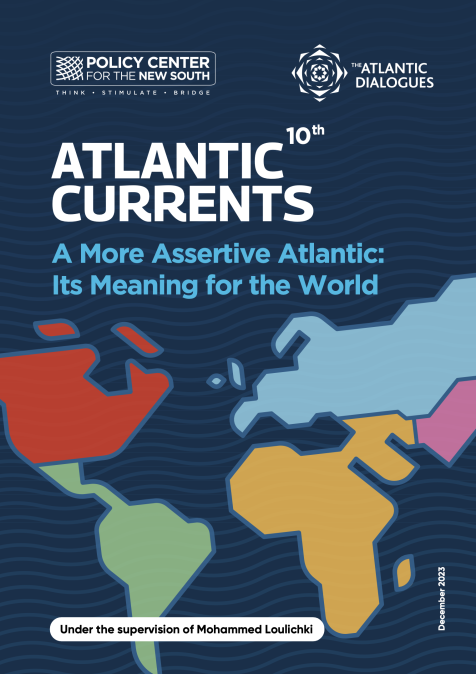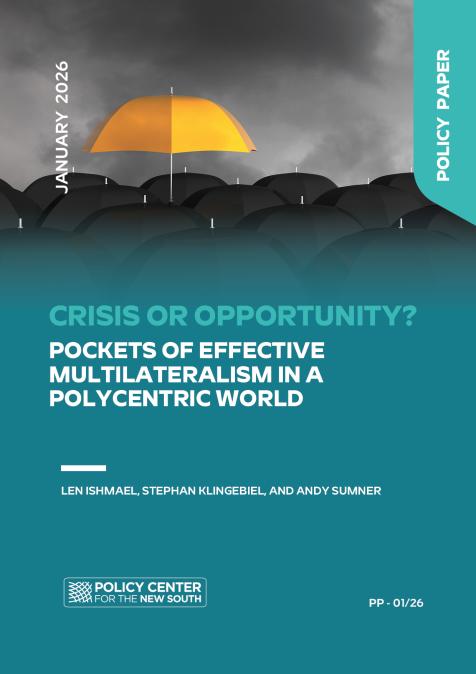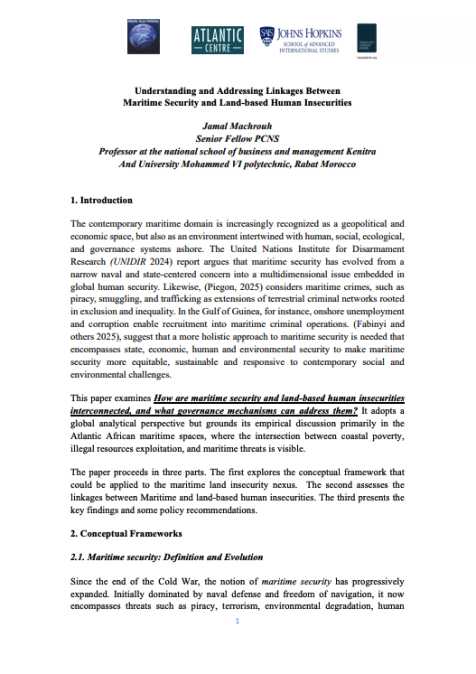Publications /
Annual Report
Book / Report
It gives me pleasure to introduce the 2023 edition of Atlantic Currents, the annual report on Atlantic affairs which the Policy Center for the New South has issued since 2014.
For this 10th edition, experts from 27 countries were invited to state their views on dynamics of interest to our shared ocean. Their respective inputs made this issue the culmination of a decade of investigation, studies, and analyses that can help understand better the multifaceted challenges and opportunities lying ahead of the Atlantic. In total, the successive reports have regrouped over 120 contributions offering nuanced geographic and thematic perspectives from distinguished authors, including former Heads of government, Ministers of Foreign Affairs, and other cabinet members, as well as top executives from major Think tanks around the Atlantic Basin. Our report has illustrated how, while much focus has been directed to the Indo-Pacific and the US/China rivalry, the Atlantic region has seen noteworthy developments. In particular, transatlantic initiatives have seemingly intensified over the past two years.
In Morocco, the Royal speech delivered on the occasion of the 48th anniversary of the Green March gave particular attention to the Atlantic. The King presented “the Atlantic coast [as a] gateway to Africa and the Americas” and vowed to “transform the Atlantic region into a space for human interaction and economic integration, and to make sure it plays a key role at continental and international levels.”
In Africa, new life was breathed into the African Atlantic States Process (AASP) initiated in 2009 by Morocco and revived with two ministerial meetings held in 2022 and 2023. The secretariat of the process, headquartered in Rabat, has been assigned the task of coordinating three working groups chaired by Cabo Verde, Gabon, and Nigeria. Morocco’s desire to strengthen its engagement with fellow Atlantic African countries has also been epitomized by efforts deployed in favor of the realization of the Morocco-Nigeria pipeline, a project that aims at boosting intracontinental cooperation across a dozen coastal Nations. The AASP and the pipeline present clear synergies with other continental projects, such as the continental free trade area, as potential tools to foster regional, cross-regional, and continental integration.
Furthermore, the continent has been the focus of renewed interest from the North Atlantic. This was exemplified by the Sixth Summit between the European Union (EU) and the African Union held in Brussels in February 2022, and the US- Africa Leaders Summit organized in Washington D.C. in December 2022.
At the same time, the US foreign policy towards its Atlantic partners has received a new impetus in recent years. By putting NATO in the center stage, the war in Ukraine enhanced the relation between North America and Europe. US cooperation with the EU also saw the creation of a Transatlantic Trade and Technology Council in a global context marked by a securitization of domestic approachestocommerceandinnovation. TheUSalsostrengtheneditsdialogue with its Southern partners in the Western Hemisphere: In 2021, Washington announced an initiative for the Northern Triangle (El Salvador, Guatemala, and Honduras) and Mexico. The following year, the US hosted the Ninth Summit for the Americas. In 2023, it announced an initiative for a stronger US-Caribbean Partnership.
In parallel, the US has also spearheaded diplomatic efforts at the Pan-Atlantic level. As a result, a joint statement on Atlantic cooperation endorsed by 18 Atlantic coastal countries was released in September 2022, and a Partnership for Atlantic Cooperation was launched in September 2023 by 32 Atlantic States.
Besides, Latin America and the Caribbean have also witnessed increased trans-Atlantic activity. The 2022 elections in Brazil paved the way for Brasilia’s rejuvenated engagement with our continent and, in July 2023, the EU and the Community of Latin American and Caribbean states held their Third Summit.
The increased presence of Nations of the South on the world stage may well have been the key geopolitical feature of recent years. Many noted that two consecutive troikas of the G20 (Indonesia-India-Brazil and India-Brazil-South Africa) were composed of developing nations, with the second involving exclusively BRICS member states. Brazil and South Africa are member states of the Zone of Peace and Cooperation of the South Atlantic (ZPCSA or ZOPACAS), and Argentina, another member state of both the ZOPACAS and the G20, was invited to join the BRICS at the 2023 Johannesburg summit. Lastly, the New Delhi recent G20 summit announced the creation of an India-Middle East-Europe corridor, a project ambitioning to connect the Indo-Pacific to the Atlantic.
All these developments point to the dynamization of a series of horizontal, vertical, diagonal, and transversal axes of cooperation and engagement across the Atlantic. They represent clear indications that the Atlantic Basin is less marginalized than one might have thought.
Mohammed Loulichki, Senior Fellow at the Policy Center for the New South







